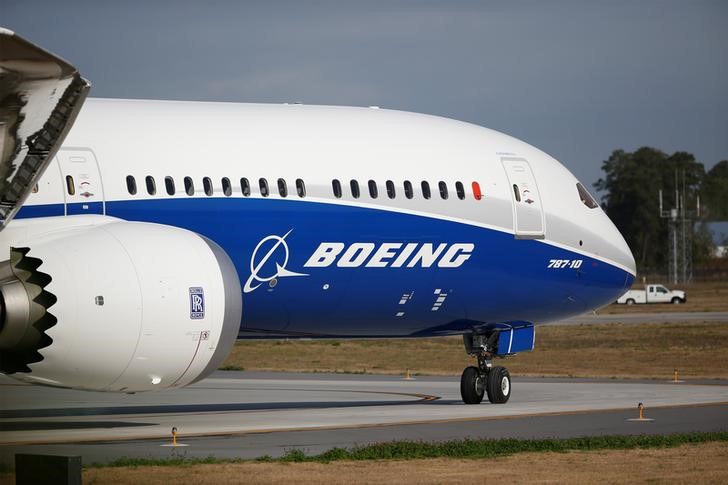By Allison Lampert and Abhijith Ganapavaram
(Reuters) -A strike starting on Friday by more than 30,000 Boeing (NYSE:) factory workers on the U.S. West Coast will make it harder for the planemaker to meet its 737 MAX production target and stabilize its supply chain, CFO Brian said West. Friday.
West also told the Morgan Stanley Laguna Conference that he expects margins at the company’s defense and aerospace unit to be negative in the third quarter, similar to those in the second quarter.
Workers from Seattle and Portland, Oregon, which produce the MAX and other planes, left their jobs after overwhelmingly rejecting a contract deal over demands for higher wages. The workers’ first strike since 2008 comes as Boeing faces heavy scrutiny from U.S. regulators and customers after a door panel blew off a 737 MAX plane in mid-air in January.
West said Boeing has made progress in ramping up production of its best-selling plane to 38 planes per month by the end of the year, despite earlier skepticism from ratings agencies about the target.
“We’ve made good progress in stabilizing production and preparing for that 38 per month by the end of the year. That’s obviously going to take longer,” West said.
However, West would not comment on details regarding the target, which depends on the duration of the attack.
The strike is creating more uncertainty and concern for suppliers of parts and components for programs like the 737 MAX. Many were already struggling to plan production due to Boeing’s repeated changes to internal supplier forecasts.
If the shutdown continues, it will have a significant impact on Boeing’s suppliers, said John Donigian, a supply chain specialist at ratings agency Moody’s.
“Boeing’s suppliers will be impacted by delayed orders and financial pressures due to the ripple effect throughout the supply chain,” Donigian said.
West suggested that Boeing would stop buying parts from some suppliers under programs affected by the strike, with the planemaker already having sufficient inventory, but would continue to buy from suppliers that are behind on their deliveries.
The company’s 787 widebody jet is not affected as it is built in South Carolina by non-union workers.
When asked about the supply chain, West said for non-787 programs, if the supplier isn’t behind and the company has enough inventory, “you know, stop supplying.”
He said these messages are happening “overnight and as we speak.”

In a note to clients, Jefferies said composites specialist Hexcel (NYSE:) would be one of the most exposed suppliers. Hexcel was not immediately available for comment.
Joe Buccino, spokesman for major Boeing supplier Spirit AeroSystems (NYSE:), which produces the 737 MAX fuselage, said: “We are committed to supporting all of our customers and will remain close to Boeing at this time.”


